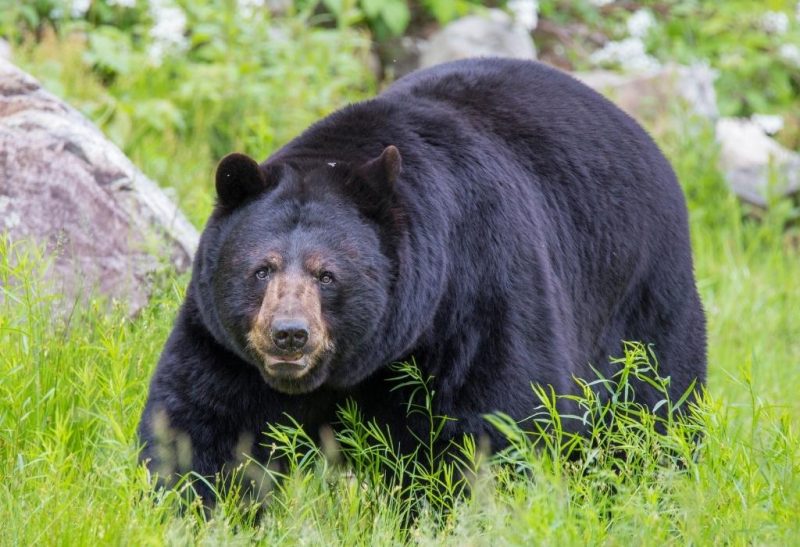Black bears are deemed dangerous, so it’s recommended to stay away from them. They can attack humans as they feel threatened. It’s also known that these bears hibernate because of food shortages.
It’s also a way to avoid the freezing temperature in winter. But it’s more important to know the time that they’re active, especially if you like hiking, camping, and outdoor activities.
When are black bears most active? Black bears are most active in the early mornings and late evenings of spring and summer. Due to his habit, they are called crepuscular. But some choose to be active at night to avoid other bears and people. Hibernation ends in late March or early April, so black bears leave their dens in these months. They forage and feed at dusk and dawn.
Another notable thing that they do outdoors is marking their home range. Males usually have a 300 square miles home range while females have up to 50 square miles.
To mark their home range, they use their claws and teeth to abrade the tree barks. With the various activities of the black bears, know more about them by reading the entire article.
Table of Contents
Black Bear Identification
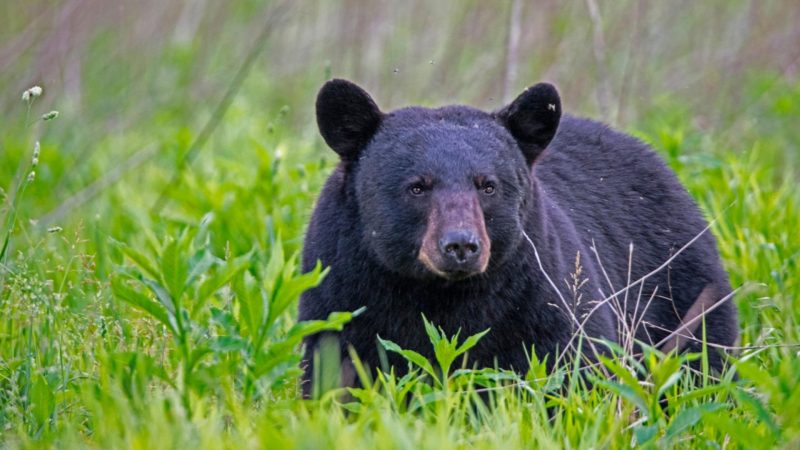
- Scientific Name: Ursus americanus
- Appearance: Blue-gray or blue-black
- Lifespan: 10 to 15 years or more
- Habitat: Mountainous area, forests, woodlands, meadows, swamps
- Height: 1.5 to 1.8 meters
- Weight: Male: 126 to 551 lbs; Female: 90 to 375 lbs
- Diet: Domestic and wildlife animals, fish, fruits, grasses, tubers, nuts,
- Place of Origin: Canada, USA, Mexico
- Characteristics: Black bears are solitary. In terms of appearance, they are large and stocky. Moreover, they have small, round ears, a short tail, and one-inch, curved, non-retractile claws on their feet. They walk on their soles and can run 30 miles per hour. These bears have poor eyesight, but they have an excellent sense of smelling and hearing. They’re good at climbing and swimming too.
What Do Black Bears Do During the Day?
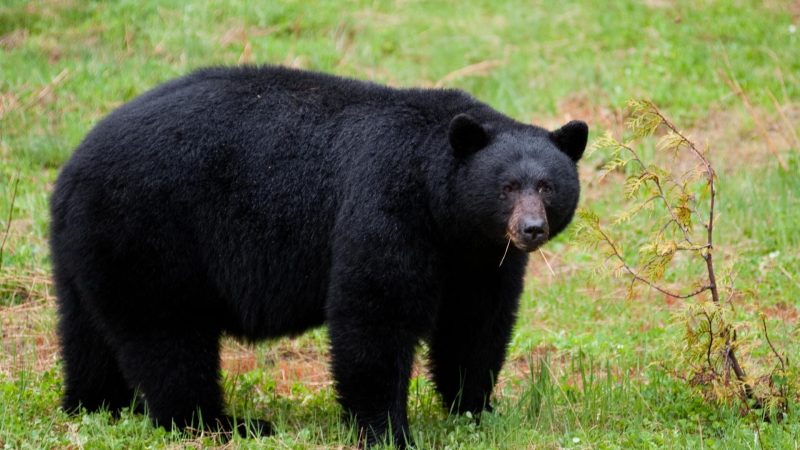
Black bears walk, swim, and play during the day. They take a nap in the hottest part of the day which is noontime and early afternoon. Black bears love water as they’re good at swimming. Thus, it’s common to see them enjoying the water in the river or lake.
They also like climbing and walking. The male bears will also wander when searching for female bears. Black bears of any gender may also travel far when food is scarce in a certain area.0.
When Do Black Bears Sleep Each Day?
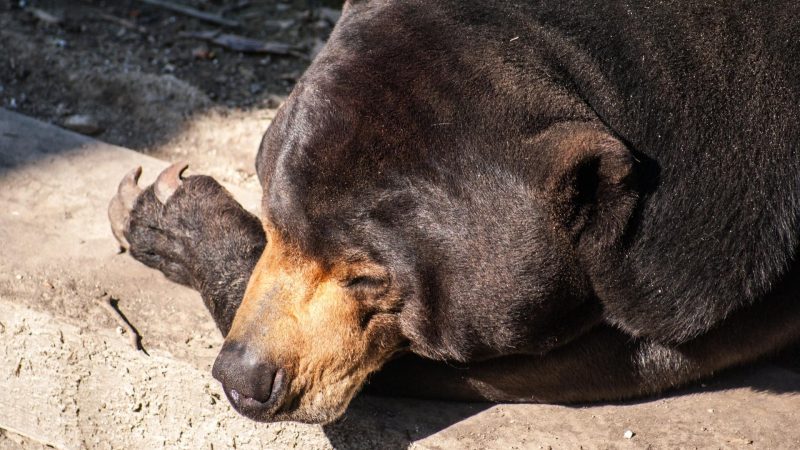
After foraging for food in the early evening, black bears sleep. They also take a nap at noon and early afternoon. Nevertheless, they also take time to sleep at night and wake up early the next day.
When it comes to their sleeping habits, they fall asleep two hours after sunset and get up half an hour before the sun rises. From midday to early afternoon, black bears find thick vegetation where they can take a nap. Typically, they do it once or twice a day.
Do Black Bears Come Out at Night?
They come out at night fairly early. Although black bears sleep at night, some of them prefer to go out at night to forage. They take chances in doing some things at night like raiding human trash as they can find food from scraps.
What Is Hibernation?
Hibernation means a drastic drop in the body temperature for most mammals but not with black bears. The body temperature of black bears is reduced by only 10 degrees.
Hence, they remain alert while in hibernation and this allows them to quickly avoid danger. They are not asleep at all but only in a state of torpor.
When it happens, the heart rate and metabolism of black bears slow down. During this period, they don’t need to eat, drink, or take a dump.
Their stored fat breaks into calories and water to sustain the body’s needs. It includes supplying body protein through organ and muscle tissues which are rebuilt by nitrogen from the basis of urine.
How Long Do Black Bears Hibernate?
Black bears begin to hibernate in October or November. They hibernate for a few weeks up to 6 or 7 months. It takes a long period for those that are located in the northern hemisphere.
Before hibernation, they store a lot of fat as it’s their response to food shortages during the cold season. The ideal places for hibernation are underground burrows, hollow trees, open-ground beds, under tree roots, and brush piles.
Since black bears mate in summer, the females deliver and take care of the cubs when in hibernation. It’s good that they can get up right away to protect their babies. Due to this behavior, scientists called them super-hibernators.
The hibernation of black bears ends in late April or early May. They’re hungry, so they leave their den and proceed to suburban landscapes in search of food.
What Months Are Black Bears More Aggressive?
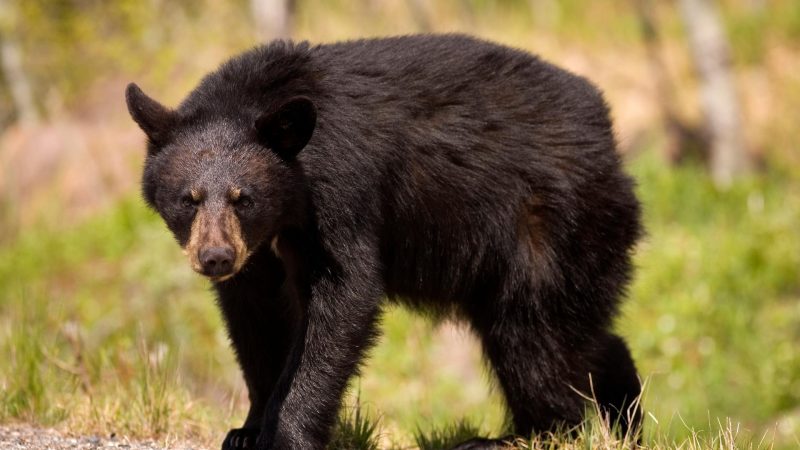
Black bears are more aggressive in August because it’s the time that they are searching for food before hibernation begins. It’s also the month that outdoor enthusiasts hike and camp.
When humans and black bears often interact with each other, there’s a high chance for these animals to become more aggressive.
There’s a low chance of black bears attacking humans, but it can happen. It happens as a defensive reaction when humans get too close. Black bears are capable of injuring or killing a person when they are two years olds.
What Time of the Day Do Bears Come Out?
Bears come out at dusk and dawn to look for food. They wake up early in the morning to enjoy some climbing, swimming, or walking. You won’t see them wandering in the hottest time of the day, which is from noon to late afternoon.
However, most black bears are diurnal, so they come out at night to avoid humans. It’s also the time that they dig the trash for food. They prefer hunting in the darkness, so it’s one reason why they come out at night. But 66% of the attacks target dogs.
Are Black Bears Aggressive?
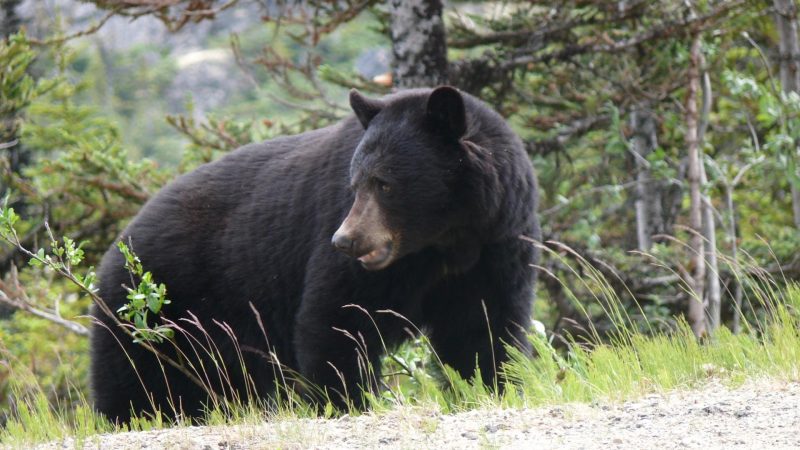
Black bears are aggressive when they feel threatened or scared. There have been 63 fatalities caused by black bears since 1900 in North America. It’s estimated as one fatality every year. As mentioned, black bears are solitary, and they tend to avoid humans.
Since they have an excellent sense of smell, they get near camping and residential areas because of the food and the dumpster. So, never put scented items in your tent and put a distance where you sit from the cooking area.
Campers can get a bear bag or bear canister to keep food and scented items. It should be placed at least 15 feet above the ground.
Black bears will attack once humans are close to them. There’s a high chance for this to happen when a Mama bear and the cubs are around. However, it’s a rare occasion that they act predatorily against humans.
Still, the possibility of a black bear attack shouldn’t be taken lightly. The females can weigh up to 200 pounds while the males are up to 500 pounds. They can be as tall as six feet. With their size, it’s something that you have to worry about.
When a black bear attacks, it swings its paws. Its curved claws can leave scratches on your skin. When it bites, it’s not as strong as a grizzly’s, but it’s enough to end a person’s life.
It’s the reason why it’s advised to not get near black bears. When going hiking, you should avoid coming across wild animals, including black bears to keep yourself safe.
Summary
Black bears are most active early in the morning and evening as they look for food. But be wary during the night as they also choose this time to avoid people and other bears. It’s crucial to know if you go hiking, trekking, or camping because you might do these activities within the home range of the black bears.
List of Sources
Scharhag, J. M. (2019). Black Bear Attack Associations and Agency Risk Management. University of Wisconsin-Stevens Point.
Biel, M. J., Gunther, K. A. (2019). Denning and Hibernation Behavior. National Park Service U.S. Department of the Interior.
Black Bears and Hibernation. (2016). Utah State University.
